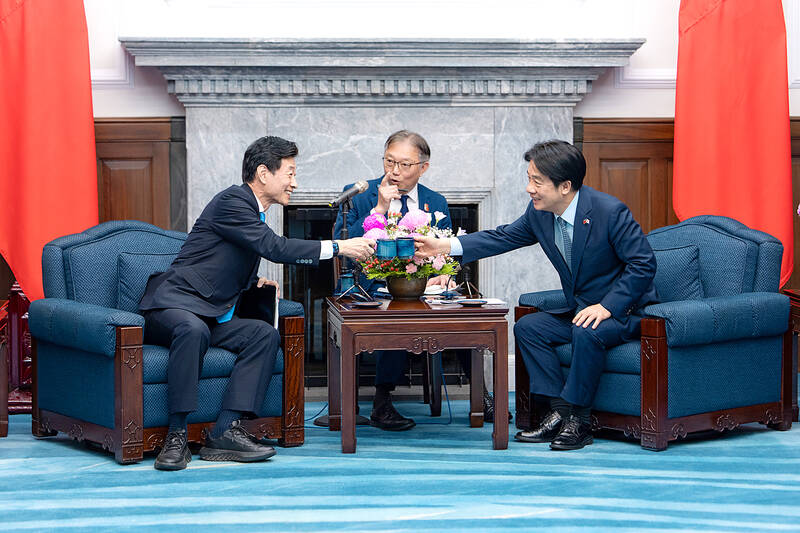Taiwan, Japan and the US are establishing closer trilateral cooperation in the semiconductor industry, forming a “semiconductor iron triangle,” a visiting former Japanese economics minister said on Monday.
Former minister of economy, trade and industry Yasutoshi Nishimura, a member of the lower house of the Diet, said during an interview that he came up with the phrase “semiconductor iron triangle” as the global semiconductor powerhouse Taiwan Semiconductor Manufacturing Co (TSMC) has a presence in Japan and the US.
TSMC has a factory in Kumamoto and is building chip fabs in Arizona, Nishimura said, adding that the Arizona factory is using Japan-made manufacturing devices and materials.

Photo: screen grab from the Presidential Office’s Flickr page
That is why the trilateral cooperation in building advanced semiconductors is heading in the right direction in enhancing global supply chains, he added.
With joint collaboration in advanced chips, Taiwan, Japan and the US can work closely in areas such as 5G, self-driving vehicles and generative artificial intelligence, he said.
Nishimura first proposed his “semiconductor iron triangle” idea during a speech to overseas Taiwanese in Japan on April 13.
Taiwan, Japan and the US need to closely unite to promote semiconductor development to jointly face an “archenemy that steals semiconductor technology for military use,” Nishimura said during that speech, apparently referring to China.
The 62-year-old Japanese politician previously served as minister of state for economic and fiscal policy and minister of economic revitalization. He promoted bilateral cooperation between Taiwan and Japan in the semiconductor industry while heading the economy and trade office from 2022 to 2023.
Other than semiconductors and high-tech goods, the visiting lawmaker also proposed closer Taipei-Tokyo exchanges in the energy sector.
Japan is set to take advantage of renewable energy and nuclear energy to ensure it has a sufficient power supply amid its push to advance new technologies, he said.
While Taiwan is phasing out nuclear energy, Taiwan and Japan can still work on renewable energy technologies such as solar, wind, hydrogen energy and storage batteries, he added.
Nishimura headed a five-member parliamentary delegation from Japan’s ruling Liberal Democratic Party from Saturday through yesterday. He was joined by party representatives Kosaburo Nishime, Kazuo Yana, Hajime Sasaki and Ryusho Kato, the Ministry of Foreign Affairs said.

The first global hotel Keys Selection by the Michelin Guide includes four hotels in Taiwan, Michelin announced yesterday. All four received the “Michelin One Key,” indicating guests are to experience a “very special stay” at any of the locations as the establishments are “a true gem with personality. Service always goes the extra mile, and the hotel provides much more than others in its price range.” Of the four hotels, three are located in Taipei and one in Taichung. In Taipei, the One Key accolades were awarded to the Capella Taipei, Kimpton Da An Taipei and Mandarin Oriental Taipei. Capella Taipei was described by

EVA Airways today confirmed the death of a flight attendant on Saturday upon their return to Taiwan and said an internal investigation has been launched, as criticism mounted over a social media post accusing the airline of failing to offer sufficient employee protections. According to the post, the flight attendant complained of feeling sick on board a flight, but was unable to take sick leave or access medical care. The crew member allegedly did not receive assistance from the chief purser, who failed to heed their requests for medical attention or call an ambulance once the flight landed, the post said. As sick

The Taichung District Court yesterday confirmed its final ruling that the marriage between teenage heir Lai (賴) and a man surnamed Hsia (夏) was legally invalid, preventing Hsia from inheriting Lai’s NT$500 million (US$16.37 million) estate. The court confirmed that Hsia chose not to appeal the civil judgement after the court handed down its ruling in June, making the decision final. In the June ruling, the court said that Lai, 18, and Hsia, 26, showed “no mutual admiration before the marriage” and that their interactions were “distant and unfamiliar.” The judge concluded that the couple lacked the “true intention of

A drunk woman was sexually assaulted inside a crowded concourse of Taipei Railway Station on Thursday last week before a foreign tourist notified police, leading to calls for better education on bystander intervention and review of security infrastructure. The man, surnamed Chiu (邱), was taken into custody on charges of sexual assault, taking advantage of the woman’s condition and public indecency. Police discovered that Chiu was a fugitive with prior convictions for vehicle theft. He has been taken into custody and is to complete his unserved six-month sentence, police said. On Thursday last week, Chiu was seen wearing a white